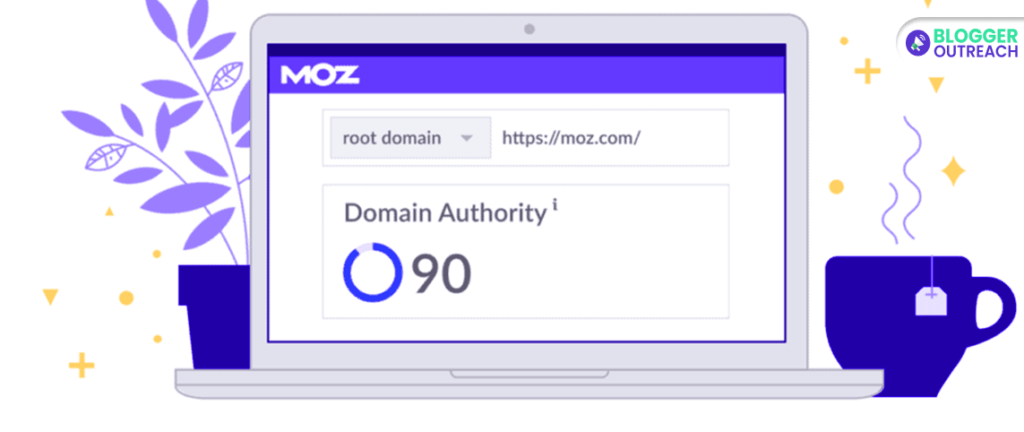Calling all the SEOs! Guess what? Link building metrics are pivotal because…
…they help you to gauge the overall health of the linking site.
When you link to a site with good metrics, you can…
… analyze a website’s authority, relevance, and reputation. This means you can target sites that actually matter in your niche, improving your site’s credibility. This way you can also predict the possible outcomes.
But that’s not all. By analyzing link quality, you ensure that the sites you choose have strong, trustworthy connections. This bolsters your site’s reputation in the eyes of search engines.
Plus, link building metrics unveil a site’s traffic patterns. This lets you tap into potential audiences, driving more visitors to your own site.
So, if you’re interested in learning more about link building metrics, we would be happy to help. Please read this article to gain a detailed understanding of each metric.
Before learning about the metric, there are two important considerations that require your attention.
Table Of Content
Key Link Building Considerations That Can Not Miss
Well, we have previously discussed link building metrics with you. Now, it’s time to share some important factors with you. To specify, these are not exactly metrics; at the same, you can not afford to miss them. So, here are they:
1. Anchor Text

Anchor text refers to the text that you can click on in a hyperlink. Though you can’t consider it among Link Building Metrics, however, you can’t avoid it while building QUALITY links.
Use relevant and fitting words for hyperlink placement. Avoid forced or overly optimized keywords.
For successful link building, anchor text should be placed naturally. Search engines value this, so prioritize organic placement for the best results.
Using natural anchor text in links helps search engines understand the context and connection of linked web pages.
❌Unnatural Anchor Text: Over-Optimized (often for SEO manipulation).
- Example: “Best chocolate cake recipe, ultimate chocolate cake recipe, perfect chocolate cake recipe.”
✅Natural Anchor Text: relevant context.
- Example: “Learn how to bake a chocolate cake.”
For users, natural anchor text provides a clear and helpful indication of what they can expect when they click the link. So…
❌Avoid using over-optimized anchor text to maintain genuine link building efforts.
❌Refrain from being seen as manipulative by search engines.
Hence, link building should be about providing value to your audience…
…NOT just focusing on keywords for SEO purposes.
In essence, your website and audience will benefit from natural anchor text in link building. Make sure to keep the link natural and meaningful, leading to relevant and valuable content.
2. Referring Domains

Referring domains are websites that link back to your website. Each unique website that links to you is considered a referring domain. When it comes to link building, focusing on referring domains makes a lot of sense.
Having backlinks from diverse reputable websites can improve your website’s authority and credibility. Search engines view backlinks from different referring domains as a sign of trustworthiness and popularity.
Earning backlinks from various sources shows that your content is valuable and relevant to different audiences. It’s not just about the number of backlinks; the quality and diversity of referring domains are equally important.
Now that you understand the key factors, let’s dig deeper into the world of link building metrics.
Click Here To Know About B2B Link Building Tactics
Here Are The Link Building Metrics
You can assess the effectiveness of your link building campaigns by understanding these crucial link building metrics.
1. Domain Authority

Well, let’s start with DA first. Domain authority is like a reputation score for your website. It shows how trustworthy and reliable it is in the eyes of search engines. It is a metric (developed by Moz) that ranges from 0 to 100.
Why Does It Matter In Link Building?
When it comes to link building, domain authority makes a lot of sense. Websites with higher domain authority carry more weight in passing on link “juice” to other sites they link to.
Get backlinks from high domain authority websites to boost your search engine ranking.
Think of it as getting a stamp of approval from respected websites – search engines see these links as votes of confidence in your content.
However, remember that quality is vital.
✅The best way to maintain a positive reputation for your site is to get relevant, authoritative, and natural backlinks. You must avoid backlinks from untrustworthy sources or ones that are not relevant to your website’s content.
Quality over quantity is what search engines look for when it comes to backlinks.
A popular saying is, “When choosing friends, I seek quality, not quantity.” The same is applicable to backlinks as well.
So, don’t try to get too many links (rather collect relevant and meaningful links).
In essence, backlinks from high domain authority are more likely to perform well.
However, having a high domain authority doesn’t guarantee high search engine rankings.
2. Domain Ratings

Domain rating, also known as DR, is a metric developed by Ahrefs. It indicates the strength and authority of a website’s backlink profile on a scale from 0 to 100.
When it comes to building links, the domain rating is an important factor to consider. Websites with a higher domain rating typically have stronger backlinks directed toward them.
✅The Importance of DR in Link Building
Getting backlinks from high domain rating sites can significantly boost your website in terms of authority and search engine rankings.
Think of it as connecting with influential sites – these strong backlinks can elevate your website’s credibility in the eyes of search engines.
However, remember that domain rating is just one of many factors to consider in link building. Relevance, context, and the linking site’s quality are also essential.
Linking with websites with a good domain rating can positively impact your domain rating, but focus on natural and organic link-building strategies.
3. Spam Score

The spam score measures the likelihood of a website being penalized as spam by search engines.
So, you want to avoid getting backlinks from websites with a high spam score, right?
Getting links from spammy sites can harm your website’s reputation and rankings in search engines.
In fact…
Spammy links on your website can lead to SEO penalties.
Instead, aim for links from websites with low spam scores and a good reputation to maintain a healthy backlink profile.
Lastly, keep in mind that some spam scores are subjective and not perfect indicators. However, it’s still a useful tool to identify potentially harmful links.
4. Organic Traffic

Organic traffic refers to the visitors who come to your website through unpaid, natural search engine results.
When it comes to link building, organic traffic makes a lot of sense. High-quality backlinks from authoritative websites can significantly boost your organic search rankings.
More backlinks from reputable sources mean more opportunities for your website to rank higher in search engine results.
Organic traffic is valuable because it brings in visitors who are actively looking for what your website offers.
Earning backlinks from high-traffic sites exposes you to a larger audience.
✅Higher Reach = Better Visibility = Boost In Rankings.
Link building with a focus on organic traffic can lead to sustainable, long-term growth for your website.
5. Page Authority

Page authority is a metric that predicts how well a specific page on your website will rank on search engine result pages (SERPs).
Certainly, when it comes to link building, higher page authority indicates more value and influence.
Getting backlinks to pages with high authority can boost their rankings and increase their visibility in search engines. So, even if you are considering all the other link building metrics – page authority is a must.
Now, think of it as giving certain pages on your website a popularity boost. The more authoritative backlinks they have, the better they will perform in search results.
In essence, Page Authority goes beyond a brief moment of fame – it’s an investment in your website’s tomorrow.
By smartly building links, you’re boosting your site’s SEO performance. Better Page
Authority means higher natural rankings, leading to more organic traffic and lasting online triumph.
6. Ranking Keywords

Ranking keywords are the keywords or phrases your website appears for in search engine results pages (SERPs). These are the terms or phrases used by search engines to determine the relevance of a website to a user’s search query.
It makes sense to focus on ranking keywords in link building. Relevant and authoritative backlinks can improve your website’s rankings for those keywords.
Anchor text with target keywords can improve page relevance and visibility for search engines.
Earning backlinks from high-ranking websites for similar keywords can boost your rankings.
However, remember that link building should not be solely focused on keywords.
So, including targeted keywords in your link building strategy improves search engine rankings.
Frequently Asked Questions (FAQs):
These are the frequently asked questions regarding “link building metrics.” Let’s dive in!
A: The key metrics in link building include Domain Authority, Page Authority, Trust Flow, Citation Flow, and the number of referring domains.
A: Link building success is measured by tracking improvements in organic rankings, increased organic traffic, and growth in the number of high-quality backlinks.
A: Link metrics are numerical values that assess the quality and authority of a website’s links, helping you gauge its potential impact on SEO.
A: Link building success depends on factors like relevancy, authority, diversity of sources, anchor text diversity, and natural link patterns. Quality content and outreach strategies also play crucial roles.
Finally, Which Link Building Metrics You Like The Most?
Hey, do not fool yourself. Each metric is important. So, when it comes to garnering quality links, you need a holistic approach…
…that encompasses all the link building metrics and the key considerations.
Particularly, there is nothing like one is over the other (link building metrics).
We hope you understand where we are coming from.
However, if you still have doubts, you can seek help from experts. Leading link building services has a website library to choose from. Their database is built on combining all of the link building metrics.
For example, let’s take BloggerOutreach for that matter. Our outreach team works diligently and created a robust database of 50,000+ websites to choose from. These sites are passed through our quality check (considering all the metrics).
Furthermore, you will get to choose sites according to your niche.
Sounds interesting right? If you want to know more about how we work – visit our website.
Read Also:









